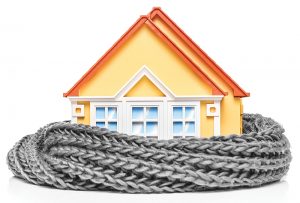 With all the planning this holiday season, home improvement projects may be the last thing on your mind. Yet with the arriving winter weather, one thing is certain: Your wallet won’t just feel lighter because of presents! Heating bills for the winter months can add even more stress to the season. Fortunately, you can take steps now to help reduce your energy bill and maintain your home’s comfort. Properly insulating your home will encourage the heat to stay in your home — and prevent your heating system from working harder, which costs you money.
With all the planning this holiday season, home improvement projects may be the last thing on your mind. Yet with the arriving winter weather, one thing is certain: Your wallet won’t just feel lighter because of presents! Heating bills for the winter months can add even more stress to the season. Fortunately, you can take steps now to help reduce your energy bill and maintain your home’s comfort. Properly insulating your home will encourage the heat to stay in your home — and prevent your heating system from working harder, which costs you money.
Here are some steps to take:
Seal up your ceiling, attic and air ducts.
If you read our article in September’s Electric Consumer or this month’s energy column (on page 10) by Jeremy Montgomery, the energy advisor at Parke County REMC, then you know the importance of properly sealing your home. Gaps around lighting, pipes and other cut-outs can cause heat to escape. Expandable foam can be used to fill the cracks and prevent escaping air. You also can review the air ducts to ensure they are air sealed and well-insulated. Since the ductwork carries the air you’ve paid to heat, any gaps or poor insulation can prevent that toasty warm air from reaching the rooms in your home.
Insulate your (older) water heater.
If you have an older water heater, you may have an inefficient water heater. An inefficient system costs more to heat and maintain water temperature. A test to see if you need more insulation is simple: Touch your water heater to see if it is noticeably warm. If it is, you should consider adding an insulating blanket by carefully following the directions. If the water heater is not warm, there is no need to add more insulation.
Insulate your water lines.
Adding insulation to your hot water pipes can help keep your water hot longer, reducing the time it can take to get hot water to your fixtures. If your water pipes are exposed to colder air, such as an unconditioned basement or crawlspace, properly insulating the water lines makes even more sense.
A home energy audit will help identify problems — and solutions.
If you want to learn more, you should contact the energy advisor at your local electric cooperative. He/she can provide details on a home energy audit and may even personally do the audit. The audit will include a thorough review of your home’s energy use, identifying potential areas of concern and even recommendations to resolve them.
Taking a few steps will help improve the comfort — and energy cost — of your home all year long. Your local electric cooperative may even offer POWER MOVES® rebates for qualifying upgrades to equipment in your home. Contact your local electric cooperative or visit www.PowerMoves.com to learn more.



